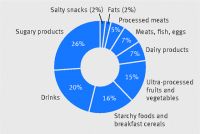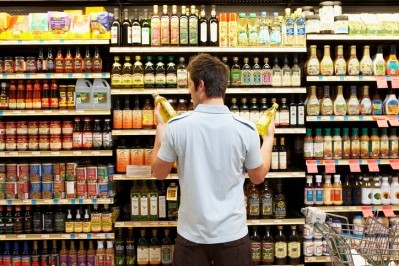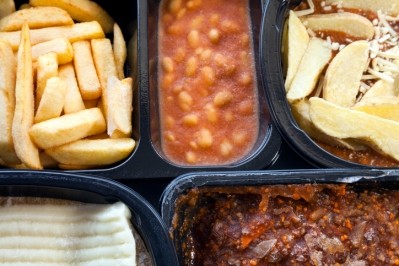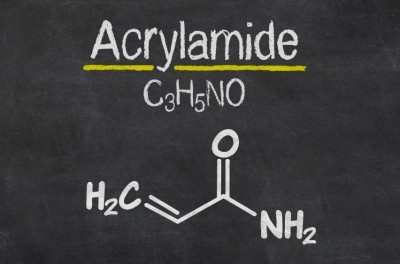Ultra-processed food may be linked to cancer: BMJ study

Looking at food consumption data for 104,980 individuals, the researchers noted that a 10% increase in the proportion of ultra-processed foods in the diet was associated with significant increases of 12% in the risk of overall cancer and 11% in the risk of breast cancer.
The researchers took data from the French NutriNet-Santé cohort, which asked participants to fill in repeated 24-hour dietary records for 3,300 food items between 2009 and 2017.
The scientists then used the NOVA food classification system, developed by Brazilian researcher Carlos Augusto Monteiro, to determine which food and drink products were ‘ultra-processed’.
The NOVA food groups
The NOVA classification system is relatively new (it was devised in 2009) and includes four groups.
Unprocessed or minimally processed foods in group one include as fresh, dry or frozen fruit and vegetables; packaged grains and pulses; flours made from corn, wheat, rye; pasta; eggs; fresh or frozen meat and fish and milk.
Group two includes processed culinary ingredients such as sugar, oils, fats, salt and other substances extracted from foods or nature used to season and cook.
Group three is made up of processed foods such as vegetables in brine, fruits in syrup, salted meat and fish, cheese and freshly made unpackaged breads.
Ultra-processed foods in group four, meanwhile, contains soft drinks, packaged snacks and confectionery; mass-produced packaged breads; reconstituted meat such as hot dogs and chicken nuggets, instant soups and noodles and industrially pre-prepared pizzas, pies and ready meals.
“[Ultra-processed foods] are also aggressively marketed often in big portion sizes and are typically designed to be consumed as snacks rather than as regular meals. All these factors induce energy over-consumption and thus overweight and obesity," write the authors.
Although the majority of participants in the NutriNet-Santé cohort study were women (78%), the amount of ultra-processed food that men and women ate was similar –
around 18.7% of overall diet for both.
Intake of ultra-processed foods was made up of sugary products (26%) and drinks (20%), followed by starchy foods and breakfast cereals (16%) and ultra-processed fruits and vegetables (15%).
Four possible explanations
The researchers offer several hypotheses as to why the increasing intake of ultra-processed food could be increasing the risk of cancer.
Poor nutritional quality
Processed food products tend to be richer in energy, sodium, fat, and sugar and poorer in fibres and various micronutrients, which, although not the only determinant, can contribute to weight gain and risk of obesity, which are recognised as “a major risk factor” for many cancer types. A diet low in fibre is associated with higher incidents of colon cancer.
Additives and the cocktail effect
Over 250 food additives are authorised for use in Europe, and while maximum safe levels have been set by the European Food Safety Authority (EFSA) to protect consumers against adverse effects, the ‘cocktail effect’ of consuming many different additives on a daily basis is largely unknown, they write.
Several studies have questioned the safety of other authorised additives, such as titanium dioxide and its nano-sized particles or aspartame, while some additives, such as sodium nitrate used in meat, may form carcinogenic nitrosamines when the meat is overcooked by consumers.
Processing contaminants
Contaminants that are formed during food processing, such as acrylamide, heterocyclic amines, polycyclic aromatic hydrocarbons or 3-MCPD, could also be responsible.
These substances have been confirmed genotoxic or carcinogenic by EFSA scientists.
Chemical contact materials
Finally, endocrine disrupting chemicals used in plastic packaging could be at fault. Bisphenol A, for instance, is suspected of migrating from the plastic packaging to the food that we eat and has been classed by the European Chemicals Agency as “a substance of very high concern”.
The precautionary principle
The researchers note the limitations of the study (see below) and say the results must be confirmed by other large-scale, population-based observational studies in different countries and settings, as well as to understand the reasons behind the link.
In the meantime, however, limiting the amount of highly processed food we eat in the name of the precautionary principle may be a solution.
“Rapidly increasing consumption of ultra-processed foods may drive an increasing burden of cancer and other non-communicable disease,” they write. “Thus, policy actions targeting product reformulation, taxation, and marketing restrictions on ultra-processed products and promotion of fresh or minimally processed foods may contribute to primary cancer prevention.
“Several countries have already introduced this aspect in their official nutritional recommendations in the name of the precautionary principle.”
Brazil’s national dietary guidelines state: “Make natural or minimally processed foods the basis of your diet [and] avoid consumption of ultra-processed foods.”
Belgium, meanwhile, recently moved products like processed meat, pizza, chocolate and sugary drinks outside of the food pyramid, and said they should be eaten “as little as possible”.
Study limitations
The study's conclusions may be limited by the fact that (as with most studies that use volunteers) participants tended to be health-conscious women with a higher socio-economic background and education level than the French average. This could have resulted in lower estimates of cancer incidence compared to national-wide levels, the author said.
They also drew attention to the possibility of “misclassification” in the NOVA food categories and the relatively short study period, which would not allow for longer-term associations between highly processed food and cancer.
Reacting to the study, a spokesperson for trade association FoodDrinkEurope (FDE) said: "The authors of the study acknowledge that 'further studies are needed to better understand the relative effect of the various dimensions of processing', which is indeed a starting point to be seriously considered, as a balanced diet would allow for a great variety of products, including processed ones. The categorisation of 'ultra-processed' used in the study also remains rather ambiguous and arbitrary."
Source: British Medical Journal
“Consumption of ultra-processed foods and cancer risk: results from NutriNet-Santé prospective cohort”
Available online ahead of print, 14 February 2018, https://doi.org/10.1136/bmj.k322
Authors: Thibault Fiolet, Serge Hercberg, Mathilde Touvier,Bernard Srour et al.

























